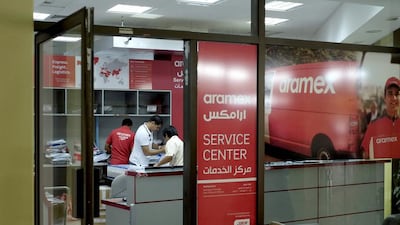Aramex is seeking up to two acquisitions in e-commerce this year as the Dubai-based courier company maintains its forecast to boost profits by at least 10 per cent, says its chief executive Hussein Hachem.
Aramex, which posted a 15 per cent increase in second-quarter net profit, is looking at light-asset e-commerce companies, especially in Sub-Saharan Africa, South East Asia and the United States.
“We are seeing a high demand and we are seeing a major shift in people’s habits when it comes to shopping,” said Mr Hachem.
E-commerce is blossoming in the Arabian Gulf region, where high GDP per capita and robust mobile penetration rates are fuelling a boom in online sales.
The e-commerce market in the Middle East was forecast to be worth US$15 billion this year, according to a 2013 report released by the electronic payment platform PayPal in conjunction with the research company Ipsos.
In May, Aramex agreed to buy a 25 per cent stake in WS One Investments for Dh9 million. Dubai-based WS operates out of Ohio in the US and provides cross-border mailbox consolidation.
Aramex last year acquired PostNet South Africa for $16.5 million and Australia's Mail Call Couriers for $26m.
Second-quarter net profit grew to Dh92.6m, up from Dh80.8m a year earlier thanks to growth in online shopping. Revenue rose about 6 per cent to Dh967m from Dh915m.
Aramex, which also posted a 15 per cent increase in net profit last year, is forecasting at least 10 per cent net profit growth this year.
Aramex’s profit forecase depends on oil prices and currency fluctuations. Revenue could have risen 10 per cent in the second quarter but for weak global currencies, it said.
Aramex, which generates about 50 per cent of its income from outside the Middle East, is also banking on e-commerce growth in Sub-Saharan Africa.
“We will focus on introducing e-payment gateways and allowing the African consumer to go online and shop from international commerce websites,” said Mr Hachem.
Regarding Iran and the removal of sanctions, Aramex expects a rebound in logistics growth once the sanctions relief list is released and businesses are allowed to resume normal operations. Most products heading to Iran are expected to be sourced from UAE’s ports and free zones, Mr Hachem added.
As for the recent cut in diesel prices in the UAE, it is still too soon to forecast the impact on the logistics sector, Mr Hachem said.
For Aramex, most of its lorries cross the UAE borders and often refuel outside the UAE, where prices can be cheaper.
“I don’t see a major real shift in costs,” said Mr Hachem. “We may have a deviation of a couple of percentages.”
Aramex shares closed 0.8 per cent higher at Dh3.45 in Dubai on Thursday.
dalwaadi@thenational.ae
Follow The National's Business section on Twitter

